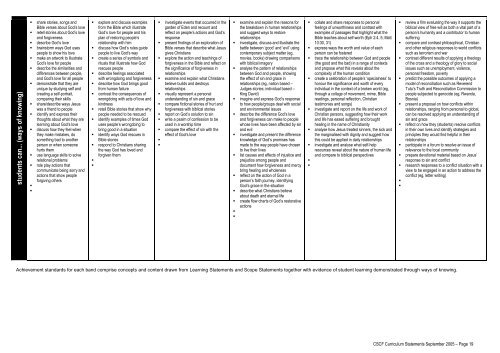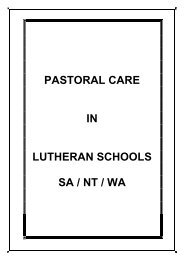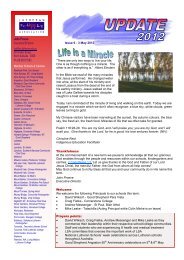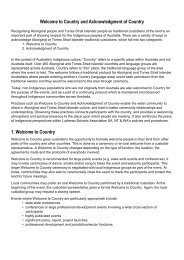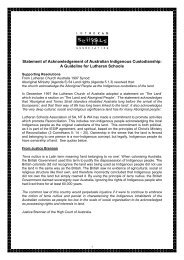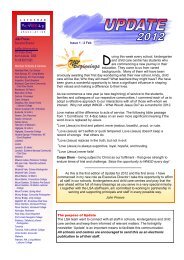students know... (knowledge and elaborations)scope statementsLearningstatementCHRISTIAN BELIEFSKey Idea 3: A Christian worldview is shaped by the biblical teaching of sin and graceBeginning Band A Band B Band C Band D Band ECB 1.3Children demonstrate anawareness of the Christian beliefthat God creates people andloves them unconditionallyCB 2.3Students analyse rescue stories fromthe BibleCB 3.3Students investigate and summarise whatthe Bible says about sin and graceCB 4.3Students examine and reflect on theimpact of sin, evil and grace in the worldCB 5.3Students apply Christian beliefs about the intrinsicvalue of human life within the context of sin and evilCB 6.3Students propose a response to crises and conflictsin the world, applying a Christian understanding ofsin and graceChristians believe God is a God of love.No action of a person, good or bad, willalter the love God has for them. God’slove is manifest in the act of creation, inparticular the creation of people, withwhom he establishes a friendship that hecontinues to seek, foster and sustain.The Bible teaches that in rejecting God’sfriendship and God’s instructions peoplebecome lost in a broken world. God’s loveovercomes people’s failings, reaching out tosave and restore them. People often repeattheir mistakes, needing continual forgivenessand guidance. God’s love and faithfulness areconstant and unfailing.The Bible teaches that people’s wilful disobediencehas serious consequences for this life and eternity.Selfishness, pride, greed and revenge result inbroken relationships. The root of sin is lack of trustand faith in God. God’s unconditional love andforgiveness of sin is demonstrated in the gift ofJesus’ saving sacrifice.According to the Bible, the fruit of sin – disharmony,judgement, death – is evident in all areas of life, thecreated world, human relationships and individualself-concept. The repercussions have beendevastating and cumulative, traced from onegeneration to the next. God’s love and forgivenessbreaks the destructive cycle of sin bringing hope andan overflow of goodness and grace.<strong>Lutheran</strong>s understand that God’s righteousness and justicerequire that sin is punished. God’s continuing love, mercy andcompassion for each person is revealed in the incarnation, thesacrificial death of his own Son, the gift of the Holy Spirit – Godbearing the judgement of sin himself. People are free to reject hisgift of forgiveness and disobey him.Christians believe they are called to the ministry of reconciliation,which means that they are to share the message of God’s loveand forgiveness and be people that bring forgiveness andhealing to broken relationships. This is part of working inpartnership with God, to be his voice and hands, to bring new lifeand hope to a suffering world.Created by God• God creates people differentto other living creatures• God creates people withbodies, feelings and the needto be with other people• only people can think aboutGodStories about God’s love (eg, firststory of creation, Noah, Abraham,Exodus, birth of Jesus, Jesuswelcoming little children, miraclestories)• God loves all people• Jesus is a special friend toeveryoneGod’s love continues• for people even when they dowrong• when things go wrongGod loves people no matter whatthey doWhat people can do when theymake mistakesBible stories which highlight God’srescue (eg, Adam and Eve, Exodusstory, Joseph ,Moses)Analysis of rescue concept,people’s need of rescue, the conceptof sinConsequences of sin for• how people feel• relationships with others• the environment• people’s relationship with GodWhat God does to rescue people• how God demonstrates his loveand care• forgivenessDifferent ways God rescues• God gives his laws• God heals• God works throughcircumstances• God works through otherpeople’s love and care• God’s ways are unpredictableand unexpectedWays people respond to beingrescuedAdam and Eve’s sin impacts all peopleWhat makes Adam and Eve’s actionssinfulGod’s response to sin• justice, punishment• provides laws to protect people andtheir relationships• forgiveness• love and reconciliation• sending a saviour – Jesus•Biblical images of sin (eg, falling short, enemy ofGod)People’s response to sin• feelings of guilt, shame, remorse,• confession, repentance, need forforgivenessBible stories that show God’s grace and mercyGod acts to bring forgiveness andreconciliation• God’s Son became a human being tosave the world• Jesus died and rose to save allpeople from sin and death• the gift of the Holy Spirit to renew,strengthen and guide• the gift of eternal lifeImages of good and evil• the cycle of grace – sin – grace• God’s friendship with Adam and Eve• a broken world – sin and evil ruinGod’s creation.• patterns of relationship with God andpeople, eg, people sin, ask forforgiveness, relationship restored• origins of sin – fall of creation, devil• human strengths and limitations ofcharacterImpact of sin and evil on the world• breakdown of God’s creation (eg,hurricanes, earthquakes)• broken relationships, eg, divorce,violence, harassment• human and environmental disasters(eg, war, famine, pollution)• evil corrupts good order• separation from God, deathEvidence of grace in the world• new beginnings• God uses people to inspire, comfort,support others• comfort of grace, forgiveness,resolution, reconciliation, restitution• God provides social structures for thewelfare of all people (eg, law, police,family, marriage, government, church)Effect of God’s promise of new life now inthe Spirit and life eternalHuman condition• God’s special creation is humanity• God gives people talents and abilities equippedfor their role on earth• sinful nature – people experience separationfrom God, others and in themselves as a resultof sin• human sin has consequences for God’screation• earthly life has an endHuman failure does not negate human worth• human worth does not depend on people’stalents, abilities or achievements; illness,handicap or age, race, colour or gender• human worth comes from God, who loves allpeople equally, evidenced by God sending hisSon for all people without exception• God accepts the sinner – God and Jesus reachout to people who have sinned (eg, King David,Peter)• Christians are called to love their enemies andforgive those who have hurt them• God’s provision for human beings• Jesus’ response to suffering• impact of human sin and evil on GodManifestations of evil• natural evil• community evil• institutional/system evil• moral/individual evilHuman beings and the problem of evil• free will• original sin• spiritual dimension of human beings• need for salvation and saviour• new creation through Christ – Christian as ‘fullyhuman’A Christian perspective• theology of the cross versus theology of glory• grace and ungrace• salvation by grace alone• justification by faith• repentance• forgiveness• sanctification• transformation• eternal life• God’s presence in a broken world• biblical concepts of reconciliationResponses to evil• revenge• indifference• models of reconciliation (eg, South AfricanTruth and Reconciliation Commission)• a compassionate lifeLuther’s teaching on• faith alone• grace alone<strong>CSCF</strong> <strong>Curriculum</strong> <strong>Statements</strong> September 2005 – Page 18
students can... (ways of knowing)• share stories, songs andBible verses about God’s love• retell stories about God’s loveand forgiveness• describe God’s love• brainstorm ways God usespeople to show his love• make an artwork to illustrateGod’s love for people• describe the similarities anddifferences between people,and God’s love for all people• demonstrate that they areunique by studying self andcreating a self-portrait,comparing their skills• share/describe ways Jesuswas a friend to people• identify and express theirthoughts about what they arelearning about God’s love• discuss how they feel whenthey make mistakes, dosomething bad to anotherperson or when someonehurts them• use language skills to solverelational problems• role play actions thatcommunicate being sorry andactions that show peopleforgiving others••• explore and discuss examplesfrom the Bible which illustrateGod’s love for people and hisplan of restoring people’srelationship with him• discuss how God’s rules guidepeople to live God’s way• create a series of symbols andrituals that illustrate how Godrescues people• describe feelings associatedwith wrongdoing and forgiveness• describe how God brings goodfrom human failure• contrast the consequences ofwrongdoing with acts of love andkindness• retell Bible stories that show whypeople needed to be rescued• identify examples of times Goduses people’s wrongdoing tobring good in a situation• identify ways God rescues inBible stories• respond to Christians sharingthe way God has loved andforgiven them••• investigate events that occurred in thegarden of Eden and recount andreflect on people’s actions and God’sresponse• present findings of an exploration ofBible verses that describe what Jesusgives Christians• explore the action and teachings offorgiveness in the Bible and reflect onthe significance of forgiveness inrelationships• examine and explain what Christiansbelieve builds and destroysrelationships• visually represent a personalunderstanding of sin and grace• compare fictional stories of hurt andforgiveness with biblical stories• report on God’s solution to sin• write a psalm of confession to beused in a worship time• compare the effect of sin with theeffect of God’s love••• examine and explain the reasons forthe breakdown in human relationshipsand suggest ways to restorerelationships• investigate, discuss and illustrate thebattle between ‘good’ and ‘evil’ usingcontemporary subject matter (eg,movies, books) drawing comparisonswith biblical imagery• analyse the pattern of relationshipsbetween God and people, showingthe effect of sin and grace inrelationships (eg, nation based –Judges stories; individual based –King David)• imagine and express God’s responseto how people/groups deal with socialand environmental issues• describe the difference God’s loveand forgiveness can make to peoplewhose lives have been affected by sinand evil• investigate and present the differenceknowledge of God’s promises hasmade to the way people have chosento live their lives• list causes and effects of injustice andprejudice among people anddocument how forgiveness and mercybring healing and wholeness• reflect on the action of God in aperson’s faith journey, identifyingGod’s grace in the situation• describe what Christians believeabout death and eternal life• create flow charts of God’s restorativeactions••• collate and share responses to personalfeelings of unworthiness and contrast withexamples of passages that highlight what theBible teaches about self-worth (Eph 2:4, 5; Matt10:30, 31)• express ways the worth and value of eachperson can be fostered• trace the relationship between God and people(the good and the bad) in a range of contextsand propose what this reveals about thecomplexity of the human condition• create a celebration of people’s ‘specialness’ tohonour the significance and worth of everyindividual in the context of a broken world (eg,through a collage of movement, mime, Biblereadings, personal reflection, Christiantestimonies and songs)• investigate and report on the life and work ofChristian persons, suggesting how their workand life has eased suffering and broughthealing in the name of Christianity• analyse how Jesus treated sinners, the sick andthe marginalised with dignity and suggest howthis could be applied in daily relationships• investigate and analyse what self-helpresources reveal about the nature of human lifeand compare to biblical perspectives••• review a film evaluating the way it supports thebiblical view of free will as both a vital part of aperson’s humanity and a contributor to humansuffering• compare and contrast philosophical, Christianand other religious responses to world conflictssuch as terrorism and war• contrast different results of applying a theologyof the cross and a theology of glory to socialissues such as unemployment, violence,personal freedom, poverty• predict the possible outcomes of applying amodel of reconciliation such as ReverendTutu’s Truth and Reconciliation Commission topeople subjected to genocide (eg, Rwanda,Bosnia)• present a proposal on how conflicts withinrelationships, ranging from personal to global,can be resolved applying an understanding ofsin and grace• reflect on how they (students) resolve conflictsin their own lives and identify strategies andprinciples they would find helpful in theirrelationships• participate in a forum to resolve an issue ofrelevance to the local community• prepare devotional material based on Jesus’response to sin and conflict• research responses to a conflict situation with aview to be engaged in an action to address theconflict (eg, letter writing)••Achievement standards for each band comprise concepts and content drawn from Learning <strong>Statements</strong> and Scope <strong>Statements</strong> together with evidence of student learning demonstrated through ways of knowing.<strong>CSCF</strong> <strong>Curriculum</strong> <strong>Statements</strong> September 2005 – Page 19


